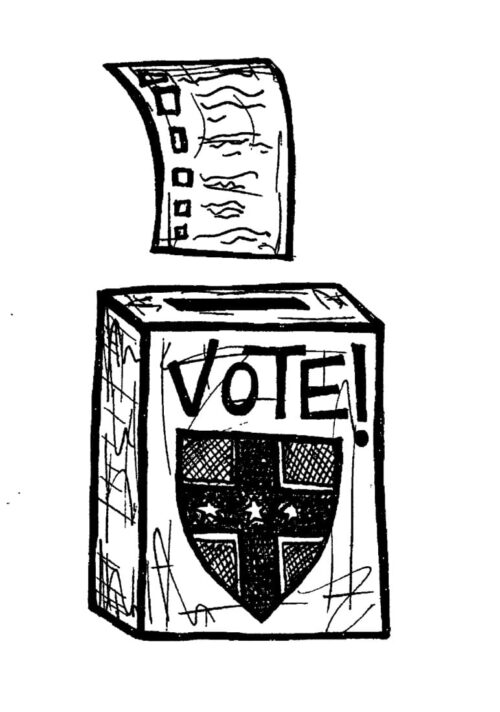A Piece of Politics
The election of a new House Committee Co-Chair
By MICHAEL KIELSTRA
The HoCo meeting started late. Outside, in the courtyard, raindrops flung themselves against the bare oak trees. The gamblers on the other side of the JCR filled out prediction sheets or brackets for some event or other. Up for grabs: five Blu-Rays. All eyes but theirs were on the Co-Chair as she called the meeting to order. It was election night. It was a night for shadows.
House Committee Constitutions can be vague on how exactly a special election takes place, some stating only that they “shall be governed as outlined in the By-Laws.” They occur whenever a position needs to be filled outside of the normal rotation. On this particular night, the only contested seat was that for one of the Co-Chairs, the two people who share the responsibility of being in charge. Rachel, currently Social Chair, and James, currently HoCo Secretary, were both running. (I have changed the names at their owners’ request.)
I had come at Rachel’s request, but I wasn’t sure what to expect. She spoke first, laying out how she had organized the winter formal, how much she loved the house, and how hard she had fought to make it a great place to live. James’s speech touched more on house spirit than Rachel’s had and emphasized his CV slightly less, but toward the end he mentioned that he had been shadowing the former Co-Chair and had even gone to a meeting in her stead. Both candidates then left the room so the rest of the attendees could debate. The presiding Co-Chair, who – as was determined after one of Rachel’s allies raised the point – was not required to be impartial, seconded what James had said and claimed that she felt he was ready for the role. It didn’t help his case. Rachel eventually won.
I later got the chance to talk to both parties, and learn about the history behind that election. James clarified that he was neither a golden boy of HoCo nor a strict establishment candidate, but rather “the only person that [the Co-Chair] knew of that was interested in running for the role.” He had been shadowing her not in hopes of an uncontested election, but in case of one. Rachel later told me that she had not made herself known to the Co-Chair in the same way that James had because she had wanted to gain experience as Social Chair before trying for a Co-Chair position. There were no major secrets involved and very little, if any, drama; both Rachel and James agreed that the other would have been equally qualified, and Rachel even mentioned that she and James had made a pact to support whoever was elected.
That said, I was still curious about the way the campaigns had been run. James said that the election could have gone either way but, in the end, “she got more people, that were closer to her, there, and that’s what matters.” Rachel, explaining her election strategy to me, began with, “We just asked our friends if they would support us and if they had time to vote for us.” (Rachel was nominated for Co-Chair by a blockmate of hers, while James nominated himself. Everyone who ran for an uncontested position that night nominated him- or herself.) Rachel told me she had memorized the speech she gave, but she mentioned nothing about what she put in it or why. The aim of the game, it appeared, was to bring your friends together and give them something that they could reasonably vote for.
The openness of HoCo elections enables this strategy. In general, anyone who lives in the house can vote. Policing tends to be done on an honor system: There is no standard voter roll, and no IDs are checked. Names are taken only sporadically, and the minutes for the meeting mention “Others” under “General [as opposed to HoCo board] Present.” The major defense against voter fraud seems to be that nobody cares enough about a HoCo election to try to defraud it. Each house is home to several hundred students, and every one of them receives multiple emails about these sorts of elections, but, in this case, fewer than fifty showed up. This sort of lassitude is not unusual for Harvard student government. In the 2019 midterm UC elections, Lowell had the highest voter turnout of all houses at 6.6% and Cabot’s most dominant write-in vote was for “35lb Dumbbells” (complete with one vote for “The other 35lb dumbbell”).
In-person elections, therefore, are dominated by get-out-the-vote efforts for two reasons. First, they are small enough that bringing your own people is a viable election tactic; second, they are thought unimportant enough that most people there can be assumed to be there out of loyalty to one candidate or another, so bringing your own people becomes the only viable election tactic. In a way, this is still perfectly democratic: You win by having the most people who support you. To those for whom it seems unsatisfying, all I can suggest is to go to more HoCo elections and read the minutes of the meetings. It’s all very nice to ask for candidates to be elected on the basis of policy, but that requires people being willing to take time out of their schedules to check up on how those policies are being implemented. Until that happens, election night will remain a night for texting friends, a night for grabbing people from the dining hall, a night for counting who has the most people waiting in the shadows.
Michael Kielstra ’22 (pmkielstra@college.harvard.edu) did get-out-the-vote with the IOP once, got his laptop soaking wet, and never went back.

